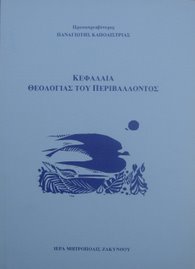— Archbishop Job of Telmessos
The Orthodox Church has been a pioneer in addressing the environmental crisis since 1986. If she did so, it was definitely not out of political correctness or for demagogic reasons, but on the basis of deep theological convictions: as we read in the first book of the Bible, in Genesis, the world has been created good by God (Gen 1), and man has been established as its guardian (Gen 2:15).
The Metropolitan of Pergamon, John Zizioulas, recounts that the involvement of the Ecumenical Patriarchate of Constantinople in the protection of the creation started by reading an article by Lynn White, entitled “The Historical Roots of our Ecologic Crisis” published in 1967 in the journal Science. This article already asserted that the roots of the ecological crisis were theological. According to White, Christian theology was largely responsible for the ecological crisis because of the divine command of the book of Genesis: “Be fruitful, multiply, fill the earth, and subjugate it; and rule over the fish of the sea, over the birds of the air, and over every animal that moves on the earth” (Gen 1:28). Although this article primarily criticized Western Christianity, the Orthodox Church could not remain indifferent to the ecological crisis but had to be self-critical in asking whether Orthodox theology was responsible or not for the ecological crisis, and if it was the case, how to help in finding a solution.
In response to the Lynn White article, Orthodox theology underlines that man is not the processor of the earth, but its steward (oikonomos) and its guardian. Orthodox theology rejects the abuse of natural resources as a misinterpretation of God’s command to rule the world (Gen 1:28) in which White saw the cause of the contemporary environmental crisis.
Ecology is not just a problem between man and nature, but should involve first and foremost God as the Creator. Orthodox theology thus introduces a third factor in the relationship between humanity and the environment who is the Creator of humanity and of the earth, the One who instituted commandments for a harmonious coexistence of all elements of the universe. While secularism operates a division between these three factors – God, man and earth, Orthodox theology underlines that humanity has received from its Creator the mandate of serving as a steward and guardian of the creation in the commandment to preserve it. To cultivate and to preserve the earth thus implies an active responsibility. For this reason, humanity cannot remain passive or indifferent to the environmental crisis.
The rediscovery of the conception of man as steward and priest of creation explains why the commitment of the Orthodox Church to the protection of creation differs from most environmental movements – not so much in the desire to preserve natural resources or the climate, which is common to all scientists and politicians – but in the key concepts of moderation and thanksgiving.
In order to protect the gift of creation, Orthodox theology calls humanity to develop an ascetic ethos which implies moderation, sobriety and self-control. Man should not consume by impulse and beyond the limits, but rather manifest a sense of frugality and abstinence from certain goods. The ascetic way of life promoted by Orthodox theology and spirituality suggests moderation, through the practice of fasting among many other things, as well as by cultivating a sense of solidarity for the entire creation.
The practice of fasting in the Orthodox tradition involves abstinence from certain foods. As a general rule, it excludes any consumption of meat as well as certain animal products, such as eggs and dairy products. On certain days of the year even fish is excluded, as well as wine and oil. In addition to cultivating moderation in humans, this practice also allows creation to rest. But it also promotes a culture of solidarity. Indeed, the Bible and the patristic tradition teach us that the money saved through fasting – because of the deprivation of certain foods – should not be kept as gain but distributed and shared with the poor in the form of almsgiving. This social dimension of fasting ought not to be forgotten in link of the environmental crisis.
Besides the ascetic way of life, Orthodox theology also cultivates a “Eucharistic mind”. In this way, it emphasizes that the created world is not our possession, but a gift from God the Creator which man ought to receive with gratitude and thanksgiving. Indeed, when offering the Eucharistic prayer, the Orthodox Church repeats the words of King David: “Thine own of Thine own, we offer to Thee, in behalf of all, and for all” (cf. 1 Chronicles 29:14). It is significant that in the sacrament of the Eucharist, humanity offers to God what it has received from him. Man offers to God bread and wine – which are actually the transformation by man’s labor of the wheat and of the grapes found in the creation and which are a gift from the Creator. In return, God transforms through his grace the bread and the wine into the sacramental body and blood of Christ. The Eucharist is thus a perfect example of synergy: man faithfully collaborating with the will of God in a constructive, and not destructive, way. It inspires a grateful way of consuming natural resources received from the Creator which Orthodox theology precisely calls a eucharistic mind.














Δεν υπάρχουν σχόλια:
Δημοσίευση σχολίου